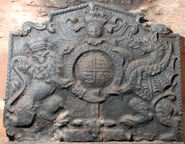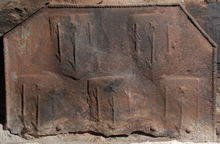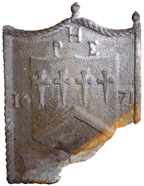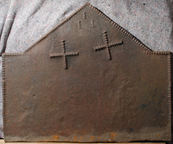-
665
Description: Rectangular; twisted rope edging (probably on on top and sides only); cavetto-moulded-edged rectangle top centre, enclosing date between initials; 14 shields of Ayloffe impaling Sulyard in three rows (5-4-5).
Notes: Ayloffe: sable, a lion rampant Or, collared gules, between three crosses formy of the second; Sulyard: argent, a chevron gules between three pheons inverted sable. William Ayloffe (c1535-1584) of Bretons, Hornchurch, Essex, Justice of the Court of Queen’s Bench, married (c1560) Jane, dau. of Sir Eustace Sulyard, of Runwell, Essex. There is a large number of variants using the same shields. The bottom part of the fireback is obscured in the photograph. The initials 'CT' are likely to be those of Charles Tyler, a founder whose working life and that of his family have strong parallels with the occurrence of these firebacks.
Inscription: C.1.6.0.3.T
Arms: Ayloffe impaling Sulyard (William Ayloffe of Bretons, Hornchurch)
- Decoration tags:
- rectangular (shape)
- rope (edging)
- carved stamps
- individual letters
- individual numbers
- armorial
- text
Manufactured: in 1603 possibly at Bedgebury Furnace, Goudhurst in the Weald area of England.
Current location: in private hands, Rolvenden, Kent, England.
Citation: Gardner, J. S., 1898, 'Iron Casting in the Weald', Archaeologia, 56, 1, pp. 133-164.
- Attached to series:
- Ayloffe series
- Personal armorial firebacks
-
368
Description: Canted rectangle; twisted rope edging (top and sides); Tudor royal shield within a Garter, supported by lion and dragon stamps, a crown above, between separate ‘E’ and ‘R’ stamps; fleur de lys stamp irregularly repeated four times below right and to left of lion.
Notes: The shield, garter and crown stamps appear on many firebacks, usually with left-facing lion and greyhound supporters; the presence of the shield and crown indicate the fireback is derived from the same source; the supporter stamps, which are over-pressed, are clearly derived from blocks intended to represent standing models. Formerly at Kirby Frith Hall, Leicestershire. Illustration from Schubert, 1957, pl. 7.
Inscription: HONE SOYT qVEY MAL Y PENSE
Arms: Tudor royal - Edward VI or Elizabeth I
- Decoration tags:
- rectangular with canted top corners (shape)
- rope (edging)
- carved stamps
- individual letters
- heraldic
- armorial
- royal
- text
Manufactured: in the mid- to late-16th century possibly at Pounsley Furnace, Framfield in the Weald area of England.
Current location: Newarke Houses, Leicester, Leicestershire, England.
Museum number: H.101.1930.0 (part of the Leicester City Museums museum group)
-
683
Description: Rectangular; twisted rope edging (top and sides); top left and right, Tudor rose surmounted by a crown (separate stamps); right of centre, irregular pentagram formed of a repeated length of twisted rope enclosing a Tudor rose; on either side of top point of pentagram, a triple-loop stamp irregularly spaced.
Notes: The pentagram has both Christian and occult symbolism. The fleur and the rose and crown have been seen on another fireback.
Copies of this fireback are known.
- Decoration tags:
- rectangular (shape)
- rope (edging)
- simple stamps
- carved stamps
- heraldic
- apotropaic
- objects
Manufactured: in the late-16th century possibly in the Weald area of England.
Current location: in private hands, Sevenoaks, Kent, England.
- Attached to series:
- Rope design firebacks
- Looped fleur series
- Fleur-de-lys firebacks
-
919
Description: Arched rectangular shape; rope edging (top and sides); undulating floriate design across top of rectangle, below which are alternating roses (4) and ?crowned cross stamps (5); the same cross and rose stamps decorate the arch, three crosses on each side of a rose at the top; at the base of the arch is a row of four stamps formed of a double figure-of-eight joined by opposed concave curves; the same stamps (3), rotated 90 degrees, are arranged in a row down the left side of the plate.
Notes: Similar undulating floriate designs have been seen on late-medieval and sixteenth century stools, suggesting a possible source. A fireback with the same loop stamps bears the same date using the same numerals but impressed in reverse. Unusually, the decoration down the left side is not repeated down the right side.
Inscription: 1594
- Decoration tags:
- rectangular with round arch (shape)
- rope (edging)
- simple stamps
- carved stamps
- individual numbers
- text
- plants
- objects
Manufactured: in 1594 in the Weald area of England.
Current location: Weald and Downland Living Museum, Singleton, West Sussex, England.
(part of the Weald and Downland Living Museum museum group)
- Attached to series:
- Loop stamp (early) series
- Furniture stamp firebacks
-
1094
Description: Rectangular; twisted rope edging (top and sides); top centre, crowned Tudor royal shield between a lion passant on the right and a lion passant guardant sinister on the left; in each top corner a crowned four-petal rose, below which, to the right, a left-facing 'imp' with both arms lowered; below the armorial, a crowned shield bearing initials, KH, in Lombardic lettering, above a fleur-de-lys; a much-corroded imp figure may be below the right-hand lion.
Notes: A heavily corroded variant of a type bearing Henrician heraldic elements.
Arms: Tudor royal arms of England
- Decoration tags:
- rectangular (shape)
- rope (edging)
- carved stamps
- heraldic
- armorial
- animals
- humans
Manufactured: in the mid-16th century in the Weald area of England.
Current location: Smallhythe Place, Small Hythe Road, Tenterden, Kent, England.
Museum number: 1117950 (part of the National Trust museum group)
- Attached to series:
- Royal series
-
959
Description: Arched shape; twisted rope edging (top and sides); top centre, shield of impaled arms; date above shield; initials, in triad ('F above), to right of shield.
Notes: The arms are of Sir Peter Frecheville (1575-1634) of Staveley Hall, Derbyshire, and his first wife, Joyce Osborne, née Fleetwood (d.1619), whom he had married in the year of the fireback's casting; the blazon is as follows: (Frecheville) Azure, a bend between six escallops argent; (Fleetwood) Per pale nebuly or and azure, six martlets, two, two and two counterchanged (the tinctures, as painted, are incorrect). At the bottom of the fireback there appears to be the remains of a runner by which the molten iron flowed into the sand mould.
Inscription: 1605 / PFI [triad]
Arms: Frecheville impaling Fleetwood
- Decoration tags:
- rounded arched (shape)
- rope (edging)
- whole carved pattern
- individual letters
- individual numbers
- armorial
- text
Manufactured: in 1605 probably at Staveley Furnace in the Derbyshire area of England.
Current location: Staveley Hall, Staveley Hall Drive, Staveley, Derbyshire, England.
- Attached to series:
- Personal armorial firebacks
-
692
Description: Rectangular with inclined sides, joined by scrolls to a pedimented top; twisted rope edging (top and sides); Garter enclosing the Tudor royal arms, with crowned lion and dragon supporters, helm with chapeau and lion crest, and mantling; rectangular date compartment at base; initials either side of crest.
Notes: The detached pediment is stylistically typical of the late-16th and early-17th centuries. The use of a chapeau or cap of maintenance in place of a crown above the helm is rare in this period. There is an excrescence on the casting over the jaws of the dragon caused by the pouring of the molten metal disturbing the sand mould.
Inscription: E R / Garter motto / 160[?0]
Arms: Tudor royal - Elizabeth I
- Decoration tags:
- rectangular with detached pediment (shape)
- rope (edging)
- whole carved pattern
- individual letters
- individual numbers
- armorial
- royal
- text
Manufactured: in 1600 in England.
Current location: Cothay Manor, Stawley, Somerset, England.
- Attached to series:
- Elizabethan royal armorial firebacks
- Tudor royal armorial firebacks
-
693
Description: Canted rectangle; twisted rope edging (top and sides); a shield repeated five times, each bearing three arrows palewise, points down, with a molet (star) above the middle arrow, two over three.
Notes: Three arrows form the arms of several families, so identification of the arms is not possible without the associated colouring. The star is likely to be a mark of cadency, granted to a third son. Four rivets along the base may relate to earlier repair. The fireback was formerly at Chisenbury Priory, Wiltshire. A variant with three shields (W 740mm x H 480mm) was lot 530 at Brettells auction, Newport, Salop, 1 March 2022 and again as lot 457 on 2 May 2023.
Arms: Not known
- Decoration tags:
- rectangular with canted top corners (shape)
- rope (edging)
- carved stamps
- armorial
Manufactured: in the late-16th to early-17th century in England.
Current location: Cothay Manor, Stawley, Somerset, England.
- Attached to series:
- Personal armorial firebacks
-
1078
Description: Fragment; quasi-arched rectangular shape; twisted rope or leather edging; flame on centre arch and on top corners (left missing); initials in triad above central shield with date split either side of centre; the bottom right corner is missing.
Notes: The initials are of Philip Hollins (d. 1724) of Mosslee Hall, Cheddleton, Staffordshire, and his wife Elizabeth Bage whom he married in 1671. Blazon: Argent, a chevron azure, in chief four crosses formee fitchee of the second.
Inscription: PHE [triad] / 16 71
Arms: Hollins, of Mosslee Hall
- Decoration tags:
- rectangular (shape)
- rope (edging)
- whole carved pattern
- heraldic
- armorial
- text
Manufactured: in 1671 possibly in the Staffordshire area of England.
Current location: The Potteries Museum and Art Gallery, Bethesda Street, Stoke-on-Trent, Staffordshire, England.
Museum number: LH.SH.1955.21 (part of the Stoke-on-Trent Museums museum group)
- Attached to series:
- Personal armorial firebacks
-
958
Description: Rectangle with triangular arch; twisted rope edging (top and sides); centre top, initials in triad, E above; two twisted rope crosses irregularly spaced below initials.
Notes: The initials, probably of a husband and wife, show minimal extension in the horizontal, although the 'I' has a stud halfway; the crosses almost certainly have an apotropaic purpose; the depth of the casting varies between the top, where it is thickest, and the bottom. Bellman's auction, Wisborough Green, 13 Oct 2021, lot 589 (£420).
Inscription: IEL [triad]
- Decoration tags:
- rectangular with triangular arch (shape)
- rope (edging)
- simple stamps
- carved stamps
- apotropaic
- text
Manufactured: in the late-16th to early-17th century in England.
Current location: not known.
- Attached to series:
- Rope design firebacks
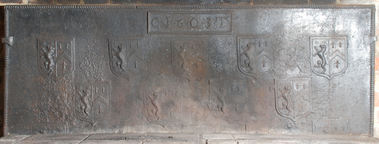
 01.jpg)




